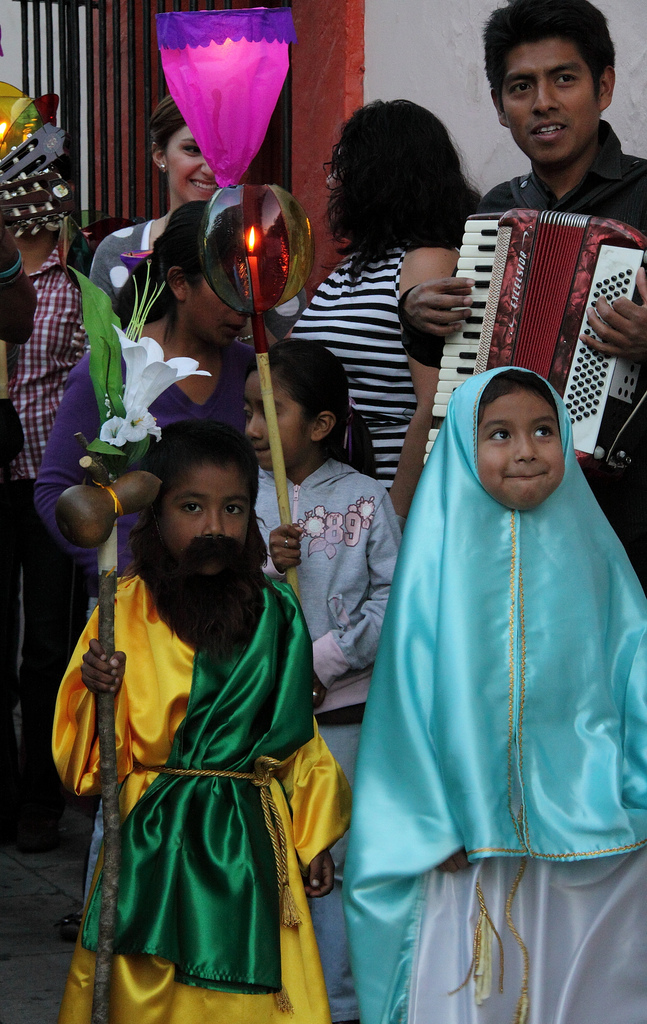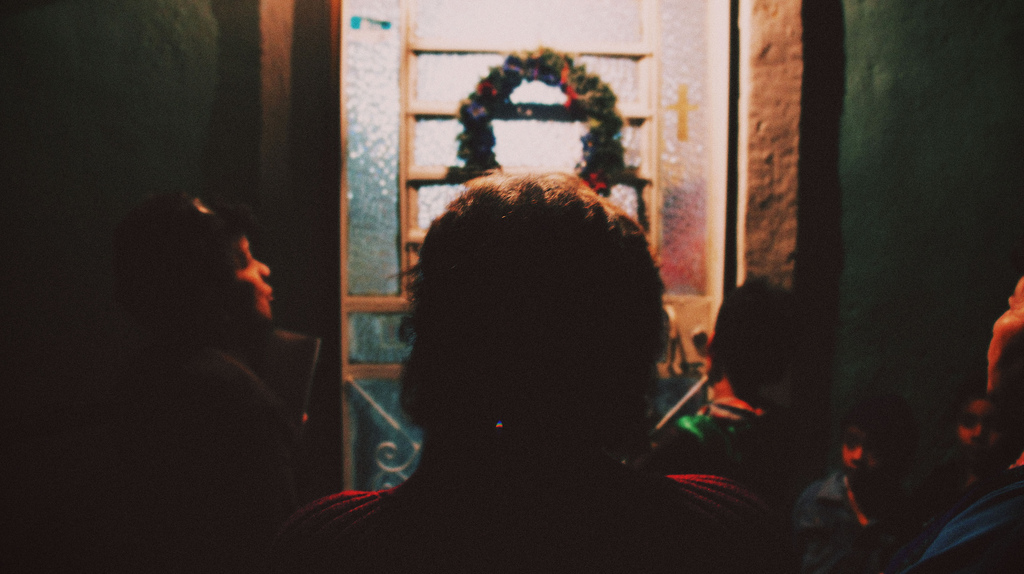by Ceci Amador
When December arrives, it brings new—and stronger—waves of Christmas-themed everything. Yet, there are some that have a harder time getting in that wonderful Christmas spirit: I am talking about myself. Don´t get me wrong, I love Christmas, but having grown up in another country (Guatemala), my Christmas preparations and traditions have been pretty different since I came to the University of Kentucky. I have realized I don´t get into the Christmas spirit until I finally make it back home. This isn´t a bad thing, I knew what I was getting into when I applied for college in the US, and it’s not like holiday activities are lacking here. On the contrary, there are several, they´re just different from what I am used to.
In a college town, by the time December rolls in, everyone wants to be done with school, go home, have a nice winter break, and enjoy some time with the family. I know I am lucky that I get to go home for the holidays; I know there are many international students who don’t. So how do they celebrate their holidays?
 I thought about Mexico, because this year´s UK Passport to the World is dedicated to Mexico, and it is pretty close to home. The tradition I am about to talk about is one that we also have in Guatemala. Why are they so similar? Probably the fact that we are neighboring Latin countries, but also—and more importantly—because Catholicism is very strong both in Guatemala and Mexico, so the holiday, for both countries, is centered on the holiday’s Biblical origins.
I thought about Mexico, because this year´s UK Passport to the World is dedicated to Mexico, and it is pretty close to home. The tradition I am about to talk about is one that we also have in Guatemala. Why are they so similar? Probably the fact that we are neighboring Latin countries, but also—and more importantly—because Catholicism is very strong both in Guatemala and Mexico, so the holiday, for both countries, is centered on the holiday’s Biblical origins.
As the story goes, José and Mary were on a pilgrimage to get to Bethlehem when Mary gave birth; however, for pregnant Mary, the journey was long and difficult, and they needed a place to rest. This led them both to go knocking on doors trying to find someone that would take them in for the night. This was not an easy quest, and one that took them a long time. In order to commemorate this journey and its hardships, Mexicans have a tradition that begins December the 16th. This tradition is known in Mexico as “Posadas.”
The word ‘posada’ means, in slang, a ‘place to crash/spend the night’. José and María were asking for posada when they knocked on door after door. So what exactly takes place during Posadas? Families, friends, neighborhoods gather together and organize posadas for 9 days, from December 16th to the 24th. These 9 days represent Mary’s nine months of pregnancy. Posadas can vary in size, some involve lots of people while others are only for small groups of friends; the main idea is to go knocking on doors and singing carols to try to convince potential hosts to let them in.
All of the houses visited are designated in advance, and it is also decided which house will be the one that takes in the figures of María and José that are being carried. This tradition is particularly popular among small children, it is a way for them to sing, bond, and learn all at once. In Mexico, it is common either for a man and woman to dress up as María and José, or to build figures of them and put them on an altar that can be carried around. If the option is the latter, then it is normally decorated. The decorations include religious ornaments as well as figures of animals, the Three Wise Men, moss, and chamomile rings.
The Posada begins once everyone arrives, and different ‘roles’ are given to the guests. Some play instruments, others sing, others carry the figures (or dress up), others hold candles, and then there are some that simply walk alongside the rest. María and José went to numerous houses that denied them a place to stay, and this is an element that plays into the Posada. Various houses deny the access to the pilgrims (all of the negotiation is done through singing of carols) and so they have to keep going until they reach the designated house that will take them in.
The final house, the one that takes them in, has food, drinks, Christmas music, and a piñata. The piñata used in Posadas is shaped like a seven-pointed star. Each point represents the seven deadly sins that are broken as soon as María and José are granted a place to stay. The piñata is normally filled with candy, and once it is fully broken, a prayer is said and the festivities begin. The process is repeated nine times, with variations in the songs, instruments, and refreshments.
Traditions vary all over the world. Whether you’re close or far away from home, you will find many around you celebrating this time of the year in their own way.
Llega el mes de diciembre y junto con él llega el comienzo del espíritu Navideño, y tanto como hay varios que disfrutan de este
espíritu desde el principio de mes, hay otros, como yo, que tienen un poco de dificultad en encontrar este espíritu. Aunque me encanta la Navidad, los últimos tres años que he vivido fuera de mi país (Guatemala), el entrar en un espíritu festivo ha sido un pequeño reto. Parte de esto se debe a que las tradiciones y preparativos a los que estoy acostumbrada no son parte de la cultura Americana.
El vivir en una ciudad universitaria va mano a mano con el hecho que cuando diciembre llega, lo único en lo que muchos pueden pensar es terminar el semestre e ir a casa. Esto aplica directamente a mí. Nomás llega diciembre, las ganas que tengo de ir de regreso a Guatemala se intensifican y realmente soy muy dichosa de poder decir que todos los años he regresado a casa para las fiestas de fin de año. Sin embargo, estoy consciente que hay varios estudiantes internacionales que no tienen la oportunidad de ir a casa. Entonces, ¿qué tanto extrañan ellos su cultura? ¿Cómo celebran ellos las fiestas? ¿Qu

é harían diferente si estuvieran en su país natal?
Un país en el que pensé fue México. Pensé en México ya que este año, el programa de UK Passport to the World es dedicado a México y también porque es un país cercano a Guatemala que comparte una tradición con la que yo crecí. La tradición de la que estoy hablando son las Posadas Navideñas. Las Posadas son una tradición prominente en ambos países, y esto se debe a la influencia de la Iglesia Católica en la cultura Latinoamericana.
La historia de la Biblia cuenta que José y María fueron de puerta en puerta pidiendo posada en su camino hacia Belén. Las posadas son esto mismo: grupos de familias, amigos y vecinos se reúnen para ir de casa en casa, cantando villancicos a pedir posada. La tradición en México comienza el 16 de diciembre y termina el 24 de diciembre. El 24 de diciembre es conocido como Noche Buena ya que es la noche en la cual María y José encontraron una posada.
La tradición Mexicana es que se hacen posadas por 9 días antes de diciembre. Los 9 días de posada representan los 9 meses de embarazo de la Virgen María. Las posadas son muy populares con los niños. Es una manera interactiva y divertida de aprender sobre religión y la importancia de la Navidad.
Suele ser la costumbre que la casa que da finalmente la posada en la noche es la casa de la persona que organizó la posada. Sin embargo, todas las casas en las cuales se pide posada han accedido a formar parte del evento. En México, la posada puede llevarse a cabo de dos maneras. Puede ser el caso que un hombre y mujer se disfrazan de José y María, o puede ser también que se construye un pequeño altar con las figuras de José, María, los Reyes Magos y animales. El altar se carga de casa en casa y normalmente los niños se turnan en llevar el peso.
No siempre se puede que todos los niños carguen el altar. Por lo cual también se dan instrumentos musicales para que los niños toquen y acompañen con los villancicos. Así como José y María pidieron posada en muchas casas, los participantes de la posada van tocando puertas hasta que llegan a la casa designada. La tradición de las posadas es una manera de rendir honor a la peregrinación de José y María.
Al llegar a la casa que dará la posada, los peregrinos son invitados a entrar. Se reza un rosario y luego se disfruta de comida, bebidas y a veces de piñatas.
